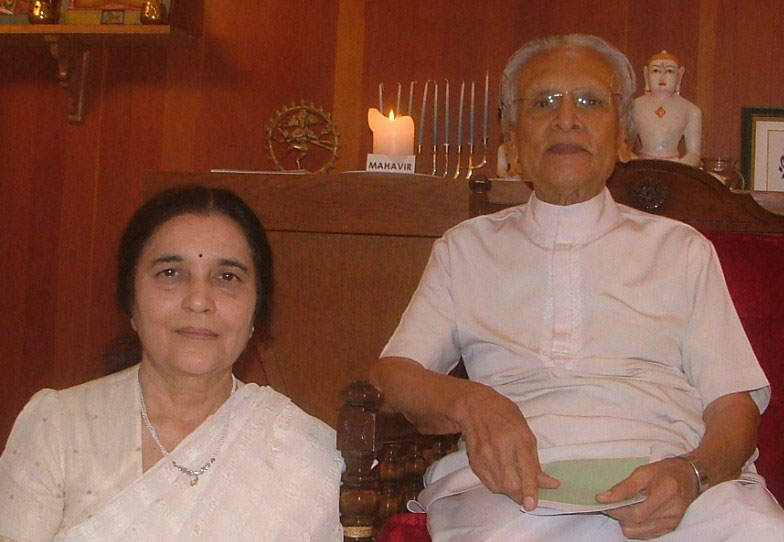Vratas - Vows
 |
By Mr. Pramoda Chitrabhanu
The Jain religion puts prime focus on renunciation. It puts a person on the road to spiritual prosperity of one's eternal inner-self instead of merely catering to the physical and illusory comforts of the body. Renunciation can be practiced through self-restraint, non-possessiveness, non attachment and abstinence.
In this context, in regard to consumption of food, the enlightened men have prescribed the quantity of food to be taken; and the kinds of food that should be taken to keep the body spiritually, mentally and physically healthy and in Judicious balance. It is very rightly said that, "You are what you eat." The Jain religion provides for the practice of many austerities. But every individual can choose and practice them according to one's ability, stamina, state of health and will power.
Below are various vratas :
(1) Navkarshi : One takes food or water 48 minutes after sunrises after reciting Navkara mantra three times. Some believe that it should be taken after 40 minutes. The period of 48 minutes is prescribed because after sunrise it takes about 48 minutes for micro beings to disperse from the atmosphere. The ultra-violet rays help this dispersion. Here the idea of non injury to the minutest form of living beings is empasised.
(2) Porasi : Taking food or water 3 hours after sunrise.
(3) Sadh-Porasi : Taking food, water etc. 4 hours and 30 minutes after sunrise.
(4) Purimuddh : Taking food and water 6 hours after sunrise.
(5) Avaddh : Taking food and water 9 hours after sunrise.
(6) Biyasam : One takes food only twice a day at one sitting each time, sitting on the ground with folded legs. The food is taken after sunrise and before sunset. If one is unable to sit on the follr one may sit on the chair.
(7) Edasan : Taking good only once a day at one sitting.
(8) Ayambil : Eating food which is devoid of any special taste or spices and which is boiled or cooked. Eating such food only once a day at one sitting is important. Milk, yogurt (curds), ghee (butter), oil and green vegetables are not allowed. Sometimes some take salt and pepper, but otherwise the food is without salt and pepper. This vrata is specially good for those suffering from skin ailments.
(9) Upavas : (Complete Fasting): When one does not take any food or water during the day and the night it is called chauvihar upvasa. But if someone desires to take water during the day then it should be boiled and be taken 48 minutes after sunrise but not after sunset. This is called tivihar upavas.
(10) Panahar : When no food or water is taken the night before doing Ekasan, Biyasan, Ayambil,Upavas etc.
(11) Chauvihar : Taking a vow not to take any food or drink after sunset.
(12) Tivihar: Taking a vow not to take anything except water after sunset.
(13) Chhatha or Bela : Complete fasting for two consecutive days with or without water.
(14) Attham or Tela : Complete fasting for three consecutive days with or without water.
(15) Atthai : Fasting for eight days continuously with or without water. Many devotees do this atthai vrata during the festival of paryushana called festival of forgiveness.
(16) Masakshman : Complete fasting for one month with or without water.
The idea behind these vratas is not merely disciplining the body but even more so disciplining one's mind and one's thought-culture. Wants are unlimited and their constant and frantic pursuit may seem to bring momentary feeling of material satisfaction but it can never bring genuine contentment. Secondly, abstinence and self-restraint also promotes culture and practice of non-violence (ahimsa) in thought, word and deed. This helps to purify oneself in a carefully controlled and guided manner as well as protects and preserves the environment which nurses live in all its abundant variety. Vratas also lead to the saving and avoidance of injury to minute living elements as they are not consumed.
Vratas, therefore do not constitute any rigid promotion of austerity but are 'practice symbols' helping the practitioner to take the path of 'aparigraha' (limiting one's need) with a feeling of mental peace and equanimity. Far from being 'rituals' , vratas are a highly effective medium of practicing the virtues of compassion, peaceful coexistence and reverence for all life.
-----------------------------------------------------
Article Courtesy : Mr. Pramoda Chitrabhanu
Jain Meditation International, Post Box No. 230244, Ansonia
New York NY 10023-0244, Tele & Fax : 212/362 6483, E-Mail : jainmamata@aol.com
-----------------------------------------------------
Mail to : Ahimsa Foundation
www.jainsamaj.org
R211102